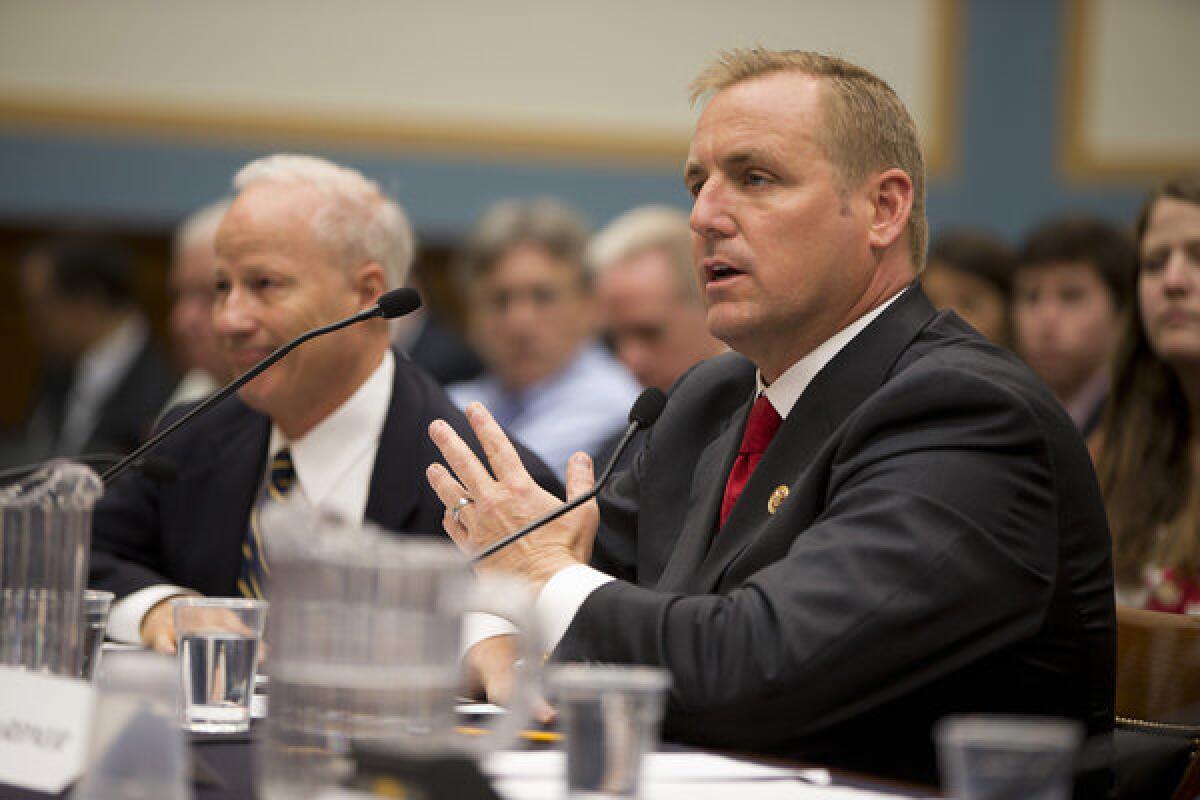Liberal group runs ads against one congressman, aiming at others

- Share via
Jeff Denham is not one of the Republican members of Congress most seriously threatened in 2014. The Modesto-area representative isn’t even the most threatened Republican in California.
But a liberal group working on behalf of President Obama and other Democrats is going after him anyway, airing ads that blame him for the “tea party shutdown” of the federal government that could “devastate middle-class families” like those in his district.
The ad airing in the Sacramento media market says Denham shut down the government—as if he were solely responsible--“putting hundreds of thousands of Americans out of work, putting critical benefits for veterans, seniors and the disabled at risk, denying cancer treatment for kids,” among other things. Identical ads—but for the targets’ names—are airing against nine other GOP members, all of whom, like Denham, may have better odds of retaining their seats than some Republican colleagues in next year’s elections.
The reason: While the ads may not work against Denham and his cohorts, they are a warning shot aimed at more vulnerable Republicans, in some cases at a lower cost. Then, too, were the political winds to shift sharply against Denham and the other nine, the nonprofit liberal activist group Americans United for Change would be in position to claim credit for surprise Republican losses.
The ads are an example of how the Democratic establishment and its allies are trying to keep pressure on opposing members of Congress as the lengthy government shutdown continues. It is simultaneously an effort to force changes in the GOP strategy and to keep the public angrier at Republicans than themselves. (So far, the second part has worked; the first not so much.) Republicans are using almost the same script to make Democrats the goats.
Denham’s campaign noted that the ad buy is minimal at this point, and limited to cable TV, which is both cheaper and less viewed than broadcast stations.
“We are not surprised that a liberal special interest group has started negative campaigning so early and is trying to exploit the situation in Washington,” said Denham’s campaign strategist, Dave Gilliard. “The ad is factually wrong. Rep. Denham did not vote to shut down the government. In fact, he voted numerous times to keep the government open; he requested his own pay be withheld during the shutdown; and he is working hard to find a compromise that will resolve the situation, protect taxpayers and get the government working again.”
Not surprisingly, since both sides are making the same case against the opponent, blame lies in the eye of the beholder. Republicans say they have pushed bills out of the House to protect women, children, veterans and the ill, but those have been turned aside by Democrats in the Senate. Democrats in the Senate say that since Republicans have refused to approve a budget unless President Obama’s healthcare plan is gutted, they should take the blame for any carnage—even if they later sought separate measures to restore favored parts of the federal government.
Jeremy Funk, a spokesman for Americans United for Change, declined to say how the ad spending was divided among the 10 targets, nor would he say how much would be spent overall except that it was in six figures. At least in Denham’s case, the buy is expected to be brief. The nonprofit group is one of many to expand its reach in the wake of court decisions loosening campaign finance rules.
Asked why the group was going after Denham and not, say, Gary Miller of Rancho Cucamonga, or the Central Valley’s David Valadao, both seen as more vulnerable, Funk acknowledged that in Miller’s case the stiff rates charged in the Los Angeles media market were part of the equation.
“Cheap points, getting most bang for the buck, was not an insignificant factor,” he said.
Republicans like Miller may be targeted later, he said. “In this effort we wanted to make examples of members in as many states as possible,” he said. “We think the message will get through to Miller and Valadao, too, of what’s coming their way if they keep enabling the tea party shutdown.”
The phrase “tea party” is apparently polling poorly—the ad uses it three times in the span of 30 seconds.
Twitter: @cathleendecker
More to Read
Sign up for Essential California
The most important California stories and recommendations in your inbox every morning.
You may occasionally receive promotional content from the Los Angeles Times.














